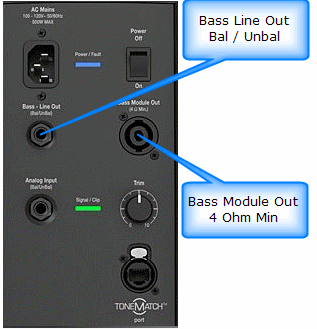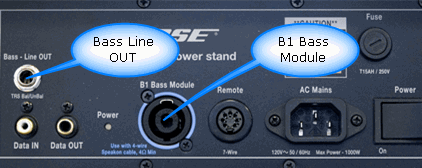Difference between revisions of "Template:Bass Line Out"
m (formatting) |
m (formatted as table) |
||
| Line 23: | Line 23: | ||
| − | ==Bass Line Out and B1 behavior == | + | == Bass Line Out and B1 behavior == |
| − | + | [[Image:ModelIBassOutputs.png|Model I right side Input/Output panel]] | |
| − | |||
| − | |||
| − | + | </includeonly> | |
| − | + | The behavior of the bass line out and B1 Bass Module outputs on the {{Classic}} and {{Model I}} are based on the philosophy that adding {{B1}}s should give the user more dynamic range (can play louder) but should not alter the tone of the instrument, including tone adjustments made using the {{R1}}, the {{T1}} or other tone-shaping equipment. | |
| − | |||
| − | |||
| − | + | This philosophy is notably different from other manufacturers, who take the approach that it's okay (or desirable) that adding more bass speakers causes the instrument tone to become "bassier". | |
| − | |||
| − | |||
| − | |||
| − | |||
| − | |||
| − | + | With this philosophy in mind, here is how the bass line out and B1 outputs work. | |
| − | + | === No cable plugged into the Bass Line out === | |
| + | <table border="0"> | ||
| + | <tr> | ||
| + | <th>B1s connected</th> | ||
| + | <th>Output</th><th>EQ</th> | ||
| + | <th>Bass Signal Gain</th> | ||
| + | </tr> | ||
| + | <tr> | ||
| + | <td>1</td> | ||
| + | <td>40Hz-{{{Crossover|180}}}Hz</td> | ||
| + | <td>B1 specific EQ</td> | ||
| + | <td>Reference Level</td> | ||
| + | </tr> | ||
| + | <tr> | ||
| + | <td>2</td> | ||
| + | <td>40Hz-{{{Crossover|180}}}Hz</td> | ||
| + | <td>B1 specific EQ</td> | ||
| + | <td>Reference Level -6 dB</td> | ||
| + | </tr> | ||
| + | </table> | ||
| + | Why? Because when you add a second B1, if you did not change the signal strength you would get 6 dB more bass relative to the mids and highs. This would alter the tone of the instrument. To keep the tone the same, while still allowing the more dynamic range (system can play louder by 6 dB) the signal level must be reduced by 6 dB. | ||
| − | === | + | === Cable connected to the Bass Line Out === |
| − | + | <table border="0"> | |
| − | + | <tr> | |
| − | + | <th>B1s connected</th> | |
| + | <th>Output</th><th>EQ</th> | ||
| + | <th>Bass Signal Gain</th> | ||
| + | <th>Notes</th> | ||
| + | </tr> | ||
| + | <tr> | ||
| + | <td style="valign;top">0</td> | ||
| + | <td style="valign;top">40Hz-{{{Crossover|180}}}Hz</td> | ||
| + | <td style="valign;top">Flat EQ</td> | ||
| + | <td style="valign;top">Reference Level - 6 dB</td> | ||
| + | </tr> | ||
| − | + | <tr> | |
| + | <td style="valign;top">1</td> | ||
| + | <td style="valign;top">40Hz-{{{Crossover|180}}}Hz</td> | ||
| + | <td style="valign;top">B1 specific EQ on Bass Line Out and B1 Out</td> | ||
| + | <td style="valign;top">Reference Level - 6 dB</td> | ||
| + | <td style="valign;top">If you are using a {{A1 EB}} this is a total of 3 B1s (2 on the A1 and 1 on the Power Stand) </td> | ||
| + | </tr> | ||
| + | <tr> | ||
| + | <td style="valign;top">2</td> | ||
| + | <td style="valign;top">40Hz-{{{Crossover|180}}}Hz</td> | ||
| + | <td style="valign;top">B1 specific EQ on Bass Line Out and B1 Out</td> | ||
| + | <td style="valign;top">Reference Level - 6 dB</td> | ||
| + | <td style="valign;top">If you are using a {{A1 EB}} this is a total of 4 B1s (2 on the A1 and 4 on the Power Stand) </td> | ||
| − | + | </tr> | |
| + | </table> | ||
| − | |||
| + | * If there is 0 x B1 connected to B1 Bass Module output on the PS1: flat EQ on Bass Line Out, bass signal gain = REFERENCE LEVEL - 6 dB | ||
| + | * If there is 1 x B1 connected to B1 Bass Module output on the PS1: B1 EQ on Bass Line Out and B1 Out, bass signal gain = REFERENCE LEVEL - 6 dB | ||
| + | ** If you are using a {{A1 EB}} this is a total of 3 B1s (2 on the A1 and 1 on the PS1) | ||
| + | * If there are 2 x B1 connected to B1 Bass Module output on the PS1: B1 EQ on Bass Line Out and B1 Out, bass signal gain = REFERENCE LEVEL - 12 dB | ||
| + | ** If you are using a {{A1 EB}} this is a total of 4 B1s | ||
| − | === | + | === With More Than 4 B1s === |
| − | + | The PS1 does not measure the exact number of {{A1}}s, so there is a slight error if you use anything but 1,2, or 4 B1s. | |
| − | |||
| − | + | For 6 B1s you will be 3.5 dB bass heavy, for 8 B1s it'll be 6 dB heavy. | |
| − | |||
| − | + | === Details for Experts === | |
| − | + | <includeonly>[[Bass Output for Experts / Classic / Model I]]</includeonly> | |
| − | + | <noinclude> | |
| − | < | + | {{:Bass Output for Experts / Classic / Model I}} |
| + | </noinclude> | ||
<noinclude> | <noinclude> | ||
---- | ---- | ||
| Line 75: | Line 112: | ||
[[Category:A1 PackLite®]] | [[Category:A1 PackLite®]] | ||
[[Category:PS1 Powerstand]] | [[Category:PS1 Powerstand]] | ||
| − | |||
[[Category:Bass]] | [[Category:Bass]] | ||
[[Category:B1 Bass Module]] | [[Category:B1 Bass Module]] | ||
</noinclude> | </noinclude> | ||
Revision as of 17:05, 14 January 2009
Usage:
{{Bass Output for Experts
|icons={{Classic icon}} (or other icons as required)
|Crossover=180 (or 200 for Model II)
}}
ContentsMost of the information here was originally written for the L1 Classic and L1 Model I. I have verified with MikeZ-at-Bose, that this is applicable to the L1 Model II. The exception is that the crossover point is 200 Hz. The Classic/Model I crossover is 180 Hz. There is a little more detail about the L1 Model II crossover at the end. ST |

|
Bass Line Out and B1 behavior
</includeonly>
The behavior of the bass line out and B1 Bass Module outputs on the L1 Classic and L1 Model I are based on the philosophy that adding B1 Bass Modules should give the user more dynamic range (can play louder) but should not alter the tone of the instrument, including tone adjustments made using the R1 Remote, the T1 ToneMatch Audio Engine or other tone-shaping equipment.
This philosophy is notably different from other manufacturers, who take the approach that it's okay (or desirable) that adding more bass speakers causes the instrument tone to become "bassier".
With this philosophy in mind, here is how the bass line out and B1 outputs work.
No cable plugged into the Bass Line out
| B1s connected | Output | EQ | Bass Signal Gain |
|---|---|---|---|
| 1 | 40Hz-180Hz | B1 specific EQ | Reference Level |
| 2 | 40Hz-180Hz | B1 specific EQ | Reference Level -6 dB |
Why? Because when you add a second B1, if you did not change the signal strength you would get 6 dB more bass relative to the mids and highs. This would alter the tone of the instrument. To keep the tone the same, while still allowing the more dynamic range (system can play louder by 6 dB) the signal level must be reduced by 6 dB.
Cable connected to the Bass Line Out
| B1s connected | Output | EQ | Bass Signal Gain | Notes |
|---|---|---|---|---|
| 0 | 40Hz-180Hz | Flat EQ | Reference Level - 6 dB | |
| 1 | 40Hz-180Hz | B1 specific EQ on Bass Line Out and B1 Out | Reference Level - 6 dB | If you are using a PackLite® power amplifier model A1 Extended Bass Package this is a total of 3 B1s (2 on the A1 and 1 on the Power Stand) |
| 2 | 40Hz-180Hz | B1 specific EQ on Bass Line Out and B1 Out | Reference Level - 6 dB | If you are using a PackLite® power amplifier model A1 Extended Bass Package this is a total of 4 B1s (2 on the A1 and 4 on the Power Stand) |
- If there is 0 x B1 connected to B1 Bass Module output on the PS1: flat EQ on Bass Line Out, bass signal gain = REFERENCE LEVEL - 6 dB
- If there is 1 x B1 connected to B1 Bass Module output on the PS1: B1 EQ on Bass Line Out and B1 Out, bass signal gain = REFERENCE LEVEL - 6 dB
- If you are using a PackLite® power amplifier model A1 Extended Bass Package this is a total of 3 B1s (2 on the A1 and 1 on the PS1)
- If there are 2 x B1 connected to B1 Bass Module output on the PS1: B1 EQ on Bass Line Out and B1 Out, bass signal gain = REFERENCE LEVEL - 12 dB
- If you are using a PackLite® power amplifier model A1 Extended Bass Package this is a total of 4 B1s
With More Than 4 B1s
The PS1 does not measure the exact number of PackLite® power amplifier model A1s, so there is a slight error if you use anything but 1,2, or 4 B1s.
For 6 B1s you will be 3.5 dB bass heavy, for 8 B1s it'll be 6 dB heavy.
Details for Experts
Bass Output for Experts / Classic / Model I
